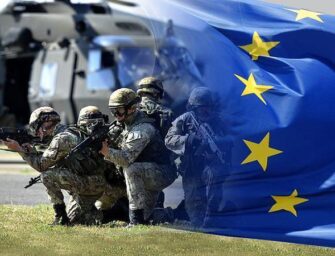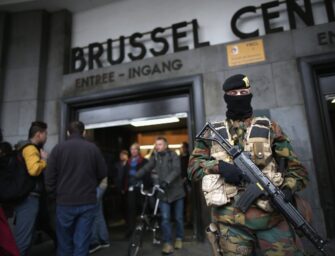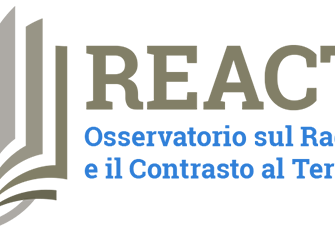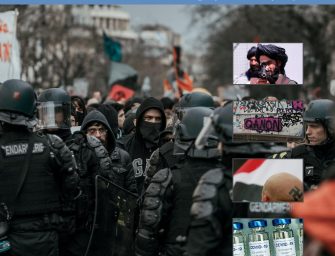#ReaCT2024 – Annual Report on Terrorism and Radicalisation in Europe
DOWNLOAD #REACT2024 FOR FREE HERE
OR PLACE AN ORDER ON AMAZON FOR A PRINTED COPY
Introduction by Claudio Bertolotti, Executive Director, ReaCT Observatory

As the Director of the Observatory on Radicalisation and Counter-Terrorism in Europe (ReaCT), I am both pleased and honored to present, for the fifth consecutive year, our annual research and analysis report on terrorism and radicalisation in Europe. Building on the foundation laid by the previous four editions, #ReaCT2024 – 5th Report on Radicalisation and Terrorism in Europe is the result of the dedication and perseverance of researchers, academics, and professionals who, employing different approaches, methods, and perspectives, contribute to a multidisciplinary effort aimed at defining the origins, causes, strengths, and vulnerabilities of a multifaceted phenomenon that traditional analytical methodologies can no longer adequately encapsulate within merely descriptive and indicative definitions. It is now well-established, as we thoroughly anticipated at the beginning of our research and editorial journey in 2020, that social deviance increasingly overlaps with or is associated with phenomena of radical violence, often characterized by individual participation and imitative behavior with a significant “spectacular” ambition, falling within increasingly compartmentalized ideological or identity spheres.

In line with the trajectory established thus far, the Report presents itself as a unique combination of a scientific journal and a collective volume, with contributions from various authors, researchers, and collaborators who have generously dedicated their time, experience, and knowledge. Without exception, ReaCT’s board and I, express our deepest gratitude for their invaluable field research contributions and their immense intellectual efforts. I would also like to thank the Italian Ministry of Defense for reaffirming their confidence and trust in the Observatory I direct by granting patronage to the Report’s presentation events.
What insights does the ongoing research of the Observatory yield?
Over the past five years, within the broader context of historical and operational evolution, the incidence of jihadist terrorist attacks shows a linear trend, with a noticeable decrease in recent years, returning to pre-ISIS/ Islamic State levels. From 2019 to 2023, 80 attacks (12 in 2023) were recorded in the European Union, the United Kingdom, and Switzerland, both successful and failed, compared to 99 in the previous period from 2014 to 2018 (12 in 2015). Following the major terrorist events in Europe associated with the Islamic State group, and subsequently in probable relation to galvanizing factors following the Taliban’s seizure of power in Afghanistan, and Hamas’ call for war against Israel, 194 actions in the name of jihad were recorded from 2014 to 2023, 70 of which were explicitly claimed by the Islamic State: 237 terrorists participated (including 7 women, 73 of whom died in action), 440 victims were killed, and 2,539 were injured (START InSight database). In 2023, 12 jihadist actions were recorded, a slight decrease compared to the 18 annual attacks in 2022 and 2021, but with a significant increase in “emulative” actions, inspired by previous attacks, bringing the figure to levels similar to those of previous years.
The 2024 Report also delves into the issue of the Islamic State in Khorasan and the potential threat to Europe, with particular attention to jihad returning from the Sahel to North Africa.
Broadening the scope, #ReaCT2024 focuses on the variables of terrorism and the characteristics of anti-system manifestations, highlighting the need to analyze an extremely dynamic phenomenon based on the spaces of action and, on a paradigmatic level, to urgently move towards a shared definition of terrorism. Another topic explored is “lone wolf terrorism,” understood as a multifaceted and fragmented phenomenon, influenced by the role of social networks, collective dynamics, clusters, and online waves and communities, along with the evolution of forms of extremism that are “young, autonomous, and emancipated.”

In this constantly evolving context, the phenomena of radicalization and extremism in digital ecosystems, new technologies, and artificial intelligence, as well as digital hate speech as precursors to extremist violence, are examined. The report also provides a thorough analysis of militant accelerationism, from the far left to the far right, and the intriguing hypothesis of “armed chaos.” On the level of prevention, substantial attention is devoted to the analysis of the Radicalization Awareness Network (RAN), providing a thorough assessment of its successes, limitations, and failures in terms of policies and practices. The focus is placed on the vexed question: will radicals ever fully de-radicalize? Significant space is also allocated to the emergence of new extremisms that carry anti-democratic demands, inviting readers to reflect on the evolution of these phenomena through two specific case studies: the first explores the prevention of radicalization and violent extremism through the contribution of security forces in Portugal; the second addresses the systemic gender discrimination in Afghanistan under the Islamist Taliban government, discussing the phenomenon of gender apartheid. In conclusion, this year’s contribution reaffirms the Observatory’s ambition to bear witness to the strength and dedication of our community of scholars and practitioners in the ongoing fight against the evolving phenomena of violent social deviance, radicalism, and terrorism. As the Director of the Observatory, my hope is that the findings and insights contained in this Report will increasingly contribute to a better understanding of the evolving threat of terrorism in Europe and serve as a call to action for all stakeholders committed to working together to prevent and counter violent extremism. I would like to extend my gratitude to all the Authors who, through their commendable work, have once again contributed to the realization of #ReaCT2024.
A special thanks goes, as always, to START InSight, whose support has enabled the international publication and distribution of our annual report. Lastly, I wish to honor the memory of our friend Marco Cochi, a serious and capable researcher, who was taken from us too soon.











































There are no comments
Add yours